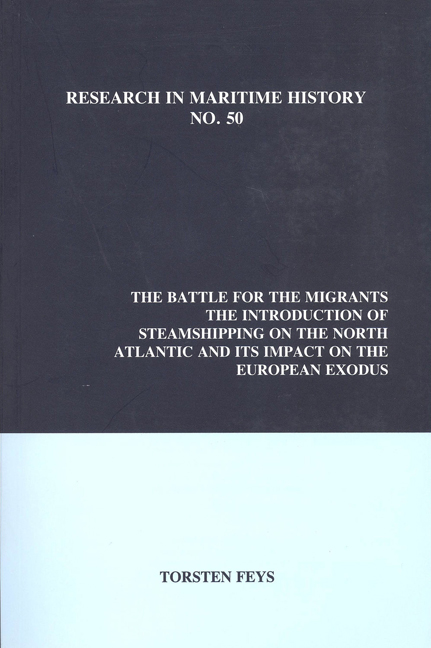 The Battle for the Migrants
The Battle for the Migrants Book contents
- Frontmatter
- Contents
- About the Author
- Acknowledgements
- Figures and Tables
- Introduction
- Part I State Policies and Their Influence on the Connections between Maritime and Migration Networks, 1830-1870
- Part II The Impact of Steam Shipping on Transatlantic Migration, 1870-1914
- Chapter 1 The Role of Middlemen
- Chapter 2 Competition and Collusion: The Growing Pains of Passenger Shipping Conferences
- Chapter 3 The IMM Merger and Further Consolidations in the Shipping Industry
- Chapter 4 The Nationalization of American Migration Policies and the Visible Hand of the Shipping Lobby
- Chapter 5 Shipping Companies' Interference with the Enactment and Implementation of Immigration Laws during the Progressive Era
- Conclusion
- Appendices
Chapter 3 - The IMM Merger and Further Consolidations in the Shipping Industry
from Part II - The Impact of Steam Shipping on Transatlantic Migration, 1870-1914
- Frontmatter
- Contents
- About the Author
- Acknowledgements
- Figures and Tables
- Introduction
- Part I State Policies and Their Influence on the Connections between Maritime and Migration Networks, 1830-1870
- Part II The Impact of Steam Shipping on Transatlantic Migration, 1870-1914
- Chapter 1 The Role of Middlemen
- Chapter 2 Competition and Collusion: The Growing Pains of Passenger Shipping Conferences
- Chapter 3 The IMM Merger and Further Consolidations in the Shipping Industry
- Chapter 4 The Nationalization of American Migration Policies and the Visible Hand of the Shipping Lobby
- Chapter 5 Shipping Companies' Interference with the Enactment and Implementation of Immigration Laws during the Progressive Era
- Conclusion
- Appendices
Summary
Conference agreements in the shipping industry boomed at the end of the nineteenth century. On the eve of World War I, over 100 agreements and consolidations regulated American foreign and domestic waterborne commerce. As contemporaries noted, despite the healthy market, only a few new passenger lines were established on the North Atlantic after 1890, and they did not play an important part in the general expansion of trade. The long-term trend towards consolidation and the legal uncertainty engendered by American legislation favoured mergers. J.P. Morgan extended his business philosophy to the shipping industry with the establishment of the International Merchant Marine (IMM), and its impact on the organization of the steerage market will be analyzed in this chapter. The chapter also takes a closer look at the strategies conferences used against outside lines. How successful was the New York Continental Conference (NYCC) in preventing new or established lines from enlarging or acquiring market share? How did this affect the internal relations among conference members and what was the impact on steerage rates? How did it affect shipping companies’ efforts to rationalize the migrant agent network through conference agreements? As well, the connections among the submarkets and the impact of increased government interference in the organization of migrant traffic will be examined. In the end, the antitrust campaign caught up with the shipping industry during the Progressive Era. The strategies used by the lines to defend the conference system during the federal investigation shed light on the growing fusion among public opinion, business, legislators and academics during this period.
Taking Horizontal Combinations a Step Further: The IMM Merger
The Supreme Court's new interpretation of the Sherman Antitrust Act in 1897 had a boomerang effect, pushing many cartel-like agreements to evolve into great corporate consolidations by way of merger. Looser agreements that looked like pools or cartels became much more vulnerable before federal courts. The shipping industry did not escape this trend, but as Alfred Chandler has noted, economic rather than legal reasons led to the administrative centralizations. Political reasons matter as well, as the interest for shipping in the United States grew after the Spanish-American War had exposed the shortcomings of domestically owned fleet. It triggered speculation about the approval of several important ship subsidies being considered by Congress.
- Type
- Chapter
- Information
- The Battle for the MigrantsThe Introduction Of Steamshipping On The North Atlantic And Its Impact On The European Exodus, pp. 163 - 210Publisher: Liverpool University PressPrint publication year: 2012
